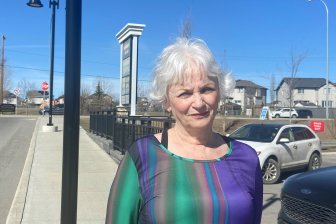Aboriginal Affairs Minister Arlene Dunn announced Wednesday that the province will appoint a commissioner to study systemic racism in New Brunswick.

The review will rely on consultations with racialized groups on their experiences with systemic racism in the province. Dunn said she hopes to see a commissioner appointed within 90 days with a final report by the end of March 2022. The final report will be made public.
“The intent here is to really do a very good review of what’s happening with respect to systemic racism and once that is done to actually come up with recommendations that can be presented to government so we can actually start changing things for people who live this every single day,” Dunn told reporters.
The government has been under pressure to call an inquiry into systemic racism against Indigenous people in the province since Chantel Moore and Rodney Levi were shot and killed in encounters with police over the summer.
Dunn, who took over the portfolio after the September general election, amended a motion on the floor of the legislature in December to remove a call for an inquiry, prompting calls from Mi’kmaw and Wolastoqey chiefs for her to resign.
At the time, Dunn said the government would not move forward with an inquiry when so many recommendations from past reports remained unfulfilled.
“I respectfully suggest that there are very good reasons to be cautious about pursuing the public inquiry route without seriously considering why the numerous recommendations from a plethora of previous inquiries have never been implemented,” Dunn said.

On Wednesday Dunn told reporters that the new study would be broader in scope than an inquiry, involving all relevant aspects of government and all racialized groups.
“We don’t want to be restrictive with respect to an inquiry route, which is typically based upon one specific issue and very restrictive,” she said. “We’re going across all government sectors, as I said earlier, and we’re going make sure that we have an all-of-government approach, that’s what we want to do. We don’t think it’s a good idea to silo some of these things.
“What has happened through education, through social development, through avenues like that. We think there is a shortcoming there and we have to address it.”
In a joint press release on Wednesday, Mi’gmawe’l Tplu’taqnn Incorporated (MTI) and the Wolastoqey Nation in New Brunswick (WNNB) called the announcement profoundly disappointing.
“This announcement does not meet the standard that MTI and WNNB had set in 2020 when the organizations had called for an inquiry into systemic racism in New Brunswick,” the release says.
“Provincial minister Arlene Dunn issued a news release with no prior consultation with the elected Chiefs of New Brunswick First Nations – and no explanation, as she sat silent on the matter in the legislature.”
MTI and WNNB have previously questioned what they have called a “unilateral” and “paternalistic” approach of the government on issues of systemic racism.
“No one from the Higgs government reached out to any of us to discuss this proposed process. Once again, the province thinks they understand racism better than those who experience it. It’s more of the same paternalism. The Province claims they value their relationship with the First Nations of this province. They have a strange way of showing it,” said Chief George Ginish of Natoaganeg First Nation.
In the past, one of the reasons Indigenous leaders have insisted upon an inquiry is the power of subpoena that comes with it.
Dunn said the commissioner in this instance will not be able to compel people or institutions to participate or hand over information, including the RCMP.
“This is not a criminal element, this is not a need for subpoenas, this is a need to really engage with the folks that experience this reality everyday and I don’t see any reason why they wouldn’t come and talk about this,” Dunn said.
“If the RCMP, for example, decides they don’t want to speak about this, well, we have lots of people in this province who’ve had experience with the RCMP so they can speak about their personal experiences.”
One of the goals of the review is to collect “qualitative and quantitative data,” but there is no requirement for police forces or the RCMP to hand over any race-based data they have collected. Dunn, though, says she’s confident police forces will be willing to co-operate.
“I think that, based upon the discussions we’ve had with a number of folks in the province, I think that there’s opportunities for us to engage with them,” Dunn said.
“I do know, in speaking with the RCMP, that the RCMP are very much concerned about the relationships, concerned about doing better with racial discrimination.”




Comments